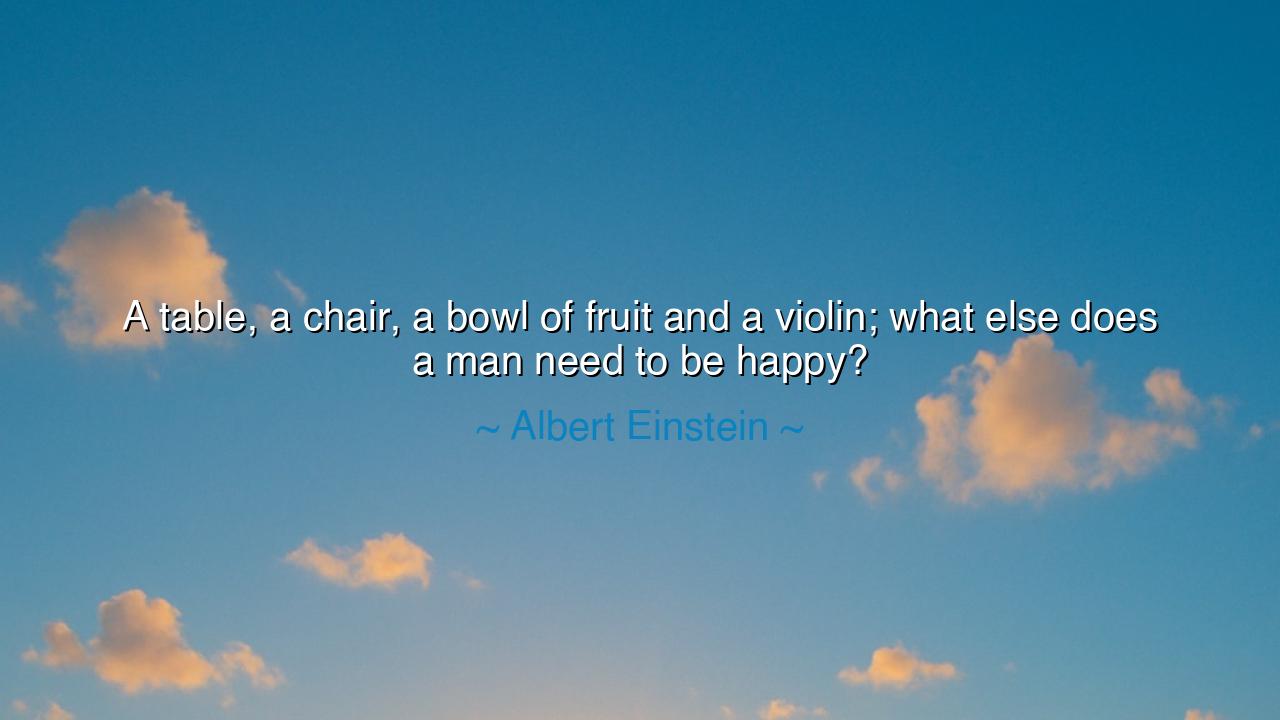
A table, a chair, a bowl of fruit and a violin; what else does a






The great thinker Albert Einstein, whose mind roamed among the stars while his heart remained humble upon the earth, once said: “A table, a chair, a bowl of fruit and a violin; what else does a man need to be happy?” At first, these words may seem simple—a passing remark of contentment. Yet within their simplicity lies a wisdom as deep as the cosmos he studied. For in this saying, Einstein speaks not of wealth or glory, but of contentment, of the quiet joy found in life’s simplest things, when the heart is at peace and the spirit is free from excess.
The table represents the foundation of life—the place of sustenance, of family, of honest work. Around it, we gather to share food, stories, and love. It reminds us that happiness does not spring from banquets or abundance, but from the gratitude that fills each humble meal. The chair symbolizes rest and reflection, the stillness needed for thought and creation. For the mind, like a flame, burns brightly only when it pauses to breathe. The bowl of fruit speaks of nature’s generosity—of the sweetness of life that grows quietly in the earth’s embrace. And the violin, ah, the violin—this is the soul’s companion, the song of beauty that reminds man of his divine nature. These four simple objects together form the architecture of a joyful life: nourishment, rest, gratitude, and art.
Einstein’s words were not the philosophy of a recluse, but the reflection of a man who had touched both greatness and solitude. He had known the storm of ambition, the burden of fame, and the grief of exile. Yet he found peace not in accolades, but in simplicity. When the world hailed him as a genius, he longed not for luxury but for quiet—time to think, to play his violin, to sit at a table with good food and better company. In his humility, he reminds us that happiness is not measured by what we possess, but by what we can cherish without needing more.
The ancients, too, would have nodded in agreement. Socrates, when asked who was the richest man, replied, “He who is content with the least, for contentment is nature’s wealth.” The Stoics taught that simplicity is the soil from which peace grows. To be surrounded by fewer things is to be surrounded by fewer distractions; to need little is to fear little. The man who owns the world but lacks joy is poor, but the one who owns a little and delights in it is truly free.
Consider the life of Leo Tolstoy, the Russian noble who renounced wealth and luxury to live among peasants. He sought truth not in palaces but in fields, and in the quiet rhythm of labor and prayer he found a happiness far greater than all the comfort he had forsaken. When asked why he chose such a life, he said, “There is only one way to be happy: to live for others and for what is simple and true.” Einstein’s thought echoes the same ancient song—that joy lives not in what dazzles the eye, but in what nourishes the heart.
To live this truth is to return to what is essential. In a world that tempts us with excess and noise, we must seek the stillness of the chair, the simplicity of the table, the nourishment of the bowl of fruit, and the inspiration of the violin—whatever form those may take in our own lives. To sit in gratitude, to create something beautiful, to savor the gifts of nature, to find peace in the ordinary—these are the quiet triumphs that make life radiant. Happiness, then, is not a distant summit to be conquered, but a garden to be tended each day with mindfulness and love.
So, my children, remember this ancient lesson wrapped in the words of a modern sage: seek not a larger life, but a deeper one. Let your joy be found not in possessions, but in presence. Cherish your small comforts—the meal before you, the melody in your heart, the company of a friend—and you will discover what kings and conquerors never do: that happiness is not a treasure to be won, but a state of grace already within your reach.
For in the end, as Einstein knew, the formula for joy is far simpler than the equations of the universe. It requires only a place to rest, something to nourish you, beauty to inspire you, and the humility to know that these are enough. Live simply, love deeply, and let gratitude be your constant companion—then you will know the quiet brilliance of a life well-lived, and your days, though humble, will shine with the light of eternity.






AAdministratorAdministrator
Welcome, honored guests. Please leave a comment, we will respond soon